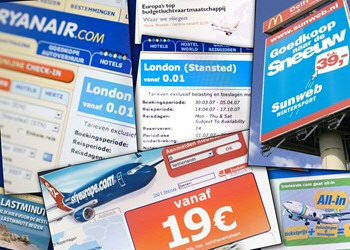Why do we believe misleading advertisements and ‘fake’ news?

How impressionable are we? When and why do we believe misleading advertisements, ‘fake’ news and misinformation? These are the questions that Bob Fennis, Professor of Consumer Behaviour, aims to answer. He is one of several UG researchers who recently received a Dutch Research Council (now) grant of €750,000.
Congratulations. How are you going to use this grant?
We are going to investigate how easy – or difficult – it is to be misled by advertising, ‘fake’ news and misinformation. To do that, we want to develop and test a new model that can predict when people are more or less susceptible to being influenced and how we can effectively protect ourselves against deception. Thanks to this grant, we will be able to appoint a PhD student to work on this project.
Previous research has presented a mixed and contradictory picture of our impressionability. Why is that?
Science is often messy. The idea that there is always scientific consensus is simply not true. Just look at the sometimes contradictory research results on COVID-19. When it comes to our impressionability or credulity, some studies show that we are very easy to influence, while others show the exact opposite. This usually means that both are true, but under different circumstances. We want to identify these circumstances.
‘Fake’ news is usually a field studied by media scholars. What can an economist/marketing researcher contribute to that?
I am not an economist; I have a background in social psychology and communication science. This perspective can help us to understand what happens to consumers when they encounter misleading information: what sticks and why? What do misleading claims look like and what makes them so compelling? What turns credulity into scepticism?

Is ‘fake’ news subject to the same mechanisms as misleading advertising?
Probably, or at least to a large extent (at least, that is the current assumption). We assume that various processes come together and jointly influence whether people say ‘yes’ or ‘no’ to misleading claims. One of these processes is the so-called truth bias: the tendency to initially accept all information (including misleading information) and only later to evaluate and correct it. That’s because it’s easier to accept it than is it is to check and correct it. We tend to do the latter when there are strong indications that the information is false and when we have the time, motivation and skills to do so. That’s often not the case.
‘Fake’ news usually circulates in a particular bubble driven by a particular conviction. Misleading advertising seems to be more widespread and mainstream. Or is ‘fake’ news also becoming more mainstream?
The explosion of social media and other forms of online information is pushing almost all forms of misleading information to the surface. Deep-fake technology is one factor, but so is, for example, the shamelessness of Trump’s lying and twisting of facts. By simply repeating the same untruth over and over again (e.g. the lies about the election), many people start to believe it. With so many misleading claims being bandied about, it’s inevitable that their acceptance will also increase.
Misleading advertisements can be reported to the Advertising Code Committee. Do you also think that there should be an appeal body for news, other than the Press Council? A similar initiative at the EU level was not particularly successful...
We need to continue to actively protect ourselves against deception. So I welcome any initiative to regulate, whether that comes from the industry itself or from governments. But the key to effectively protecting ourselves lies in our own psychology, not in industry or government initiatives. We need to find out what makes our alarm bells go off when someone or something tries to mislead us. This project aims to find an answer to that question.
Do you also protect yourself from being deceived?
I try, but I am far too gullible. So I will be particularly grateful for my own research...
More information
More news
-
09 December 2025
Are robots the solution?
-
10 November 2025
Decentralization of youth care
